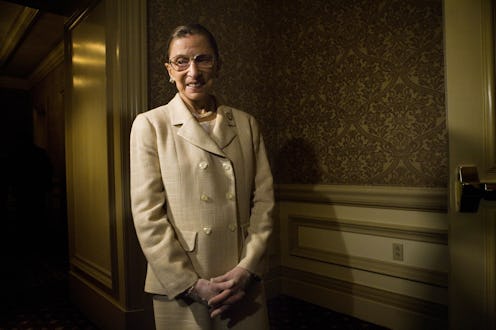News
Ruth Bader Ginsburg's Amazing Hobby Lobby Dissent
The Supreme Court's Hobby Lobby case basically turned into a heated he-said, she-said between Justices Samuel Alito and Ruth Bader Ginsburg. Alito, writing the majority opinion for the court, alleged that the ruling was very specific and wouldn't open the floodgates for further religious objections from for-profit corporations. And in a brutally awesome takedown, Ginsburg slammed the Hobby Lobby ruling in her dissent, calling it a "decision of startling breadth."
Her dissent, which was joined by Justices Elena Kagan, Sonia Sotomayor and Stephen Breyer on all but one section, is a passionate manifesto that defends American women's right to reproductive healthcare and, well, calls BS on much of Alito's reasoning.
In the 5-4 decision, the high court ruled that closely-held for-profit companies are protected by the Religious Freedom Restoration Act, and so they have a right to deny contraception coverage to their employees. The ruling effectively overrides the Health and Human Services mandate, which required all companies of a certain size to provide health insurance for contraception, including the IUD and morning-after pill.
Alito and the concurring justices were careful to tailor the decision to just contraception. The Supreme Court insisted other procedures or medications, such as vaccines, wouldn't be subject to the same reasoning. But Ginsburg didn't buy that, writing, "the Court holds that commercial enterprises, including corporations, along with partnerships and sole proprietorships, can opt out of any law (saving only tax laws) they judge incompatible with their sincerely held religious beliefs."
And that's just her first sentence.
Ginsburg alleged that the Supreme Court cared more about the religious rights of for-profit companies than the rights of the women they employed:
In the Court’s view, RFRA demands accommodation of a for-profit corporation’s religious beliefs no matter the impact that accommodation may have on third parties who do not share the corporation owners’ religious faith—in these cases, thousands of women employed by Hobby Lobby and Conestoga or dependents of persons those corporations employ.
Ginsburg then leads off with a quote from the 1992 Supreme Court abortion case Planned Parenthood v. Casey: "The ability of women to participate equally in the economic and social life of the Nation has been facilitated by their ability to control their reproductive lives."
Congress, Ginsburg writes, has delivered on this belief when it devised the Affordable Care Act. The ACA has been nothing but beneficial to women, because it helped ease the burden of healthcare cost for millions of U.S. women. After all, "the cost of an IUD is nearly equivalent to a month's full-time pay for workers earning the minimum wage," Ginsburg writes.
Ginsburg vehemently objected to the court's decision that some for-profit organizations had specific religious freedoms. According to Ginsburg, these companies shouldn't be protected because accommodations "to religious beliefs or observances ... must not significantly impinge on the interests of third parties."
The exemption sought by Hobby Lobby and Conestoga would override significant interests of the corporations’ employees and covered dependents. It would deny legions of women who do not hold their employers’ beliefs access to contraceptive coverage that the ACA would otherwise secure.
She also explains how health insurance actually works, in case her fellow justices forgot.
Undertaking the inquiry that the Court forgoes, I would conclude that the connection between the families’ religious objections and the contraceptive coverage requirement is too attenuated to rank as substantial. The requirement carries no command that Hobby Lobby or Conestoga purchase or provide the contraceptives they find objectionable. Instead, it calls on the companies covered by the requirement to direct money into undifferentiated funds that finance a wide variety of benefits under comprehensive health plans.
Ginsburg's biggest objection is to the notion that a for-profit company can have religious objections when it isn't made up of a community of believers from a single denomination, compared to traditional religious institutions. Ginsburg points out that, by law, no religious-based criteria can influence for-profit companies.
However, the Supreme Court has just given these companies the right to do so.
The distinction between a community made up of believers in the same religion and one embracing persons of diverse beliefs, clear as it is, constantly escapes the Court’s attention. One can only wonder why the Court shuts this key difference from sight. ... Again, the Court forgets that religious organizations exist to serve a community of believers. For-profit corporations do not fit that bill.
To Ginsburg, this ruling is huge — and quite frightening. As the always-eloquent justice puts it: "The court, I fear, has ventured into a minefield."
You said it, Ginsburg. The dissent was so epic that there's already a song of it making the rounds on YouTube.
